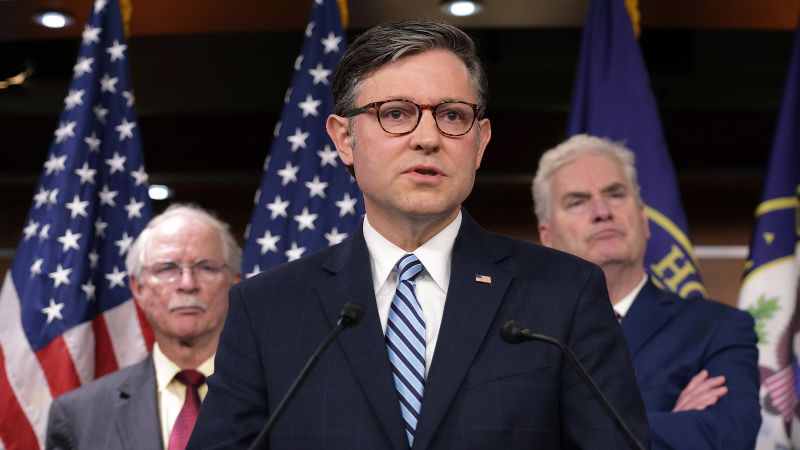In the context of a significant legislative effort in the United States, intense negotiations among House Republicans are heating up as they approach a pivotal vote scheduled for Sunday evening. This development comes in the wake of a notable setback that occurred late last week concerning a sweeping tax and spending cuts bill championed by former President Donald Trump’s administration. Republican leadership is racing against the clock to regain momentum and unify support within their ranks to ensure the bill’s passage.
House Speaker Mike Johnson, addressing the pressing concerns of party members, indicated that a potential compromise might facilitate garnering sufficient support for advancing the bill through the House Budget Committee. He mentioned that one focus of the negotiations is to hasten the implementation timeline for work requirements applicable to Medicaid recipients—an essential change that several hardline conservatives are insisting upon. This particular adjustment aims to meet the demands of more conservative members who are advocating for a stricter adherence to work conditions in exchange for government assistance.
Johnson elaborated on the complexities involved in this shift, underlining the necessity for states to recalibrate their systems and verification processes. His remarks aimed at reassuring party members that these new safeguards would be implementable and enforceable as they navigate potential legislative changes. The Speaker’s statement reflects the cautious optimism surrounding these discussions.
One notable Republican, Representative Ralph Norman from South Carolina, has voiced that these changes are not merely negotiable but critical for him to consider backing the bill. He emphasized the importance of accelerating the phase-out of tax credits for green energy projects, a component under the Inflation Reduction Act, stating that the inclusion of such amendments is non-negotiable for holdouts, stating firmly, “Otherwise, we vote no.” This sentiment embodies the solid stance taken by the more conservative members of the conference who are weighing the potential costs and benefits of the proposed legislation.
Alongside Norman, other prominent Republican holdouts include Chip Roy from Texas, Josh Brecheen from Oklahoma, and Andrew Clyde from Georgia. Their collective opposition highlights the deeply divided nature of the Republican caucus. The fiscal implications of the bill, which proposes trillions in tax cuts along with a substantial increase in military and national security budgets, primarily rely on cuts and overhauls within federal health and nutrition programs, stirring concerns among various factions within the Party.
The urgent need for negotiations is compounded by the fact that appeasing the hardliners may inadvertently dissuade moderate Republicans. These moderates are apprehensive about the ramifications of phasing out tax credits, fearing job losses in their districts, as well as the potential fallout from cuts to Medicaid benefits. Consequently, leadership needs to walk a fine line to maintain unity within the party while advancing their legislative agenda.
Despite these challenges, sources within the GOP have conveyed a degree of optimism regarding the forthcoming vote in the House Budget Committee, aimed at positioning the bill for broader legislative approval later in the week. This optimistic outlook arises from a belief that Republican unity may be achievable, albeit fragile.
Although former President Trump has not been directly involved in the recent discussions, White House officials are reportedly engaged in efforts to stabilize party support for the legislation. In parallel, certain swing-district Republicans are advocating for raising the tax rate on affluent individuals to finance the raising of limits on state and local tax deductions, known as SALT. Hardliners have cautioned that such an increase is contingent upon ensuring that the adjustments are adequately financed.
As an example of the negotiation intricacies, Representative Nick LaLota from New York has drawn attention to the financial implications of allowing the top tax rate to revert from 37% to 39.6% for high earners, positing that this could infuse the bill with an additional $300 billion—further reinforcing the complexities involved as Republicans seek consensus on a path forward amidst differing priorities and perspectives within their ranks.
In summary, the current state of negotiations among House Republicans illustrates the ongoing tension and dynamics within the party as they navigate critical legislative priorities, each vying for their interests while attempting to maintain a cohesive front to advance Trump’s tax and spending cuts bill.



